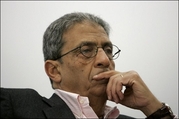 BEIRUT (AFP) – Arab League chief Amr Mussa is due to return to Lebanon next month in a new bid to help resolve the country’s acute political crisis, a government minister has said. "We’re expecting him on February 8," Telecommunication Minister Marwan Hamadeh told AFP Wednesday."Regardless of progress (on resolving the crisis), his presence has become indispensable," he said.
BEIRUT (AFP) – Arab League chief Amr Mussa is due to return to Lebanon next month in a new bid to help resolve the country’s acute political crisis, a government minister has said. "We’re expecting him on February 8," Telecommunication Minister Marwan Hamadeh told AFP Wednesday."Regardless of progress (on resolving the crisis), his presence has become indispensable," he said.
Prime Minister Fuad Siniora and other participants in the Paris III conference "have insisted on Mussa’s return", Hamadeh added, referring to a January 25 donors’ meeting in the French capital that gathered 7.6 billion dollars in aid to help revive Lebanon’s ailing economy.Fears that Lebanon’s political crisis could slide into armed conflict grew after clashes last week between opposition and government supporters left seven people dead and about 300 injured.
Siniora on Tuesday welcomed a call for calm and dialogue by Hezbollah leader Hassan Nasrallah, whose party has been spearheading the pro-Syrian opposition campaign to oust the Western-backed government.
Contacts have been under way with Saudi Arabia and Iran, as well as the Arab League, since six pro-Syrian ministers walked out of the Siniora cabinet in mid-November.
Hezbollah has been calling for the resignation of Siniora and the installation of a new unity government in which the opposition, which also includes Christian and pro-Syrian factions, would have a veto.
The Syrian government daily Tishrin, meanwhile, Wednesday accused US President George W Bush of exploiting tensions in Lebanon so as to divide the country.
On Monday, Bush deplored last week’s violence in Lebanon and warned that Iran, Syria and Hezbollah must be "called to account" for trying to destabilise that country.
"While Lebanon’s friends seek to help the Lebanese government build a free, sovereign, and prosperous country, Syria, Iran and Hezbollah are working to destabilise Lebanese society," Bush said in a statement.
The Damascus daily retorted that Bush was targetting the three powers because his policies in Iraq had reached a "dead end" and he was "acting stupidly" in Lebanon to deflect attention.
Bush, it added, was working to "inflame the situation in Lebanon by ending the coexistence between the various Lebanese parties and causing division."
US policy in Lebanon, Tishrin said, was similar to that of Israel’s and was likely to bring "chaos to Lebanon".



